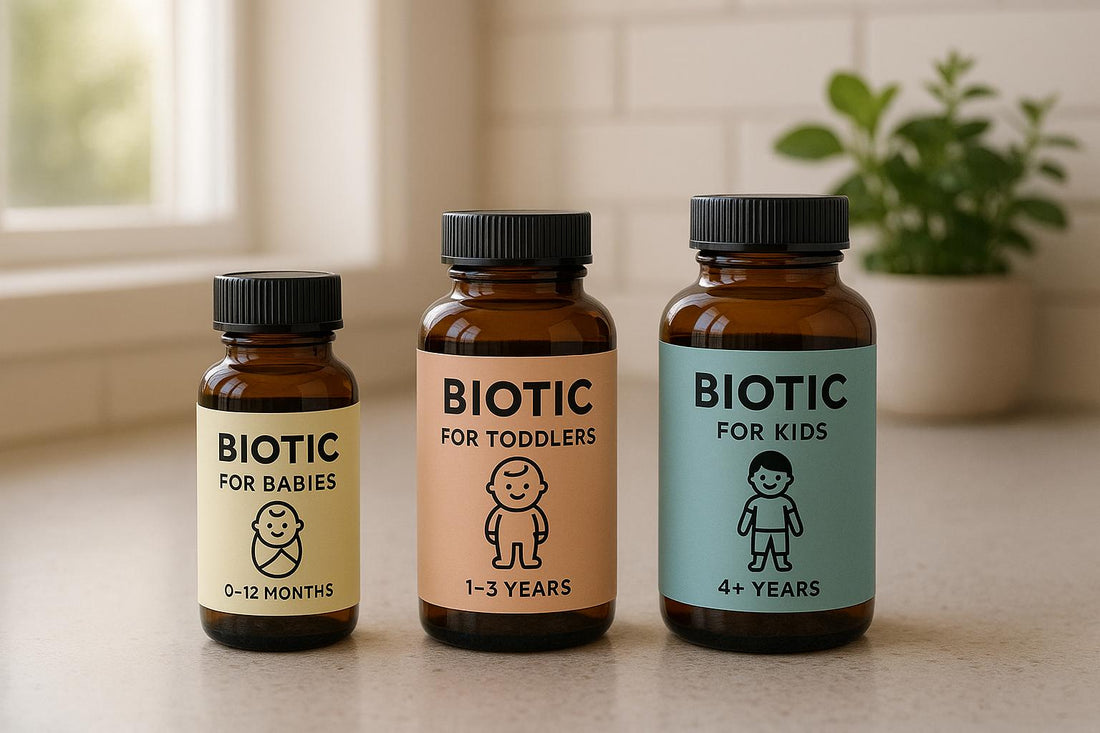Supporting your child's gut health is key to their overall well-being. From boosting immunity to aiding digestion and even influencing mood, the gut plays a huge role in development. Choosing the right biotic supplement tailored to your child’s age can make a big difference.
Here’s a quick rundown of the top 5 biotics for kids, their key features, and age suitability:
- Begin Rebirth RE-1™: High-strength (500 billion CFU), 3-in-1 formula with probiotics, prebiotics, and postbiotics. Suitable for ages 12 months and up.
- Florastor Kids Daily Probiotic: A single-strain yeast-based probiotic (Saccharomyces boulardii), safe for infants as young as 2 months.
- Lovebug Toddler Probiotics: Designed for toddlers (12 months to 4 years) with 15 billion CFU from 8 targeted strains.
- NOW BerryDophilus Kids Chewables: A chewable option for ages 2+, featuring 10 probiotic strains and a berry flavor.
- PDS-08 Pediatric Daily Synbiotic: Combines probiotics and prebiotics for kids aged 3–17, with 20 billion AFU and blends for gut, respiratory, and skin health.
Quick Comparison
| Product | Age Range | CFU/AFU Content | Key Strains | Format | Dietary Notes |
|---|---|---|---|---|---|
| Begin Rebirth RE-1™ | 12 months+ | 500 billion CFU | Human Origin Strains (HOSt™) | Powder sachets | Vegan, allergen-free |
| Florastor Kids | 2 months+ | 5 billion CFU | Saccharomyces boulardii | Powder sachets | Gluten-free, vegetarian |
| Lovebug Toddler Probiotics | 12 months–4 years | 15 billion CFU | 8 strains (Bifidobacterium, Lactobacillus) | Stick packs | Non-GMO, allergen-free |
| NOW BerryDophilus | 2 years+ | 2 billion CFU | 10 probiotic strains | Chewable tablets | Vegetarian, gluten-free |
| PDS-08 Synbiotic | 3–17 years | 20 billion AFU | 9 strains in 3 functional blends | Powder sachets | Vegan, allergen-free |
Each product is tailored to specific age groups, offering options that range from high-CFU powders to kid-friendly chewables. Always consult a pediatrician to ensure the right fit for your child’s needs.
The Use and Misuse of Probiotics in Children: What is the Evidence? - Hania Szajewska, MD (4/10/25)
1. Begin Rebirth RE-1™
Begin Rebirth RE-1™ is a medical-grade, 3-in-1 eubiotic synbiotic that combines prebiotics, probiotics, and postbiotics into one solution. This formula is specifically crafted to support the developing gut microbiomes of children by providing beneficial microbes and postbiotic compounds. It also aims to address challenges like dysbiosis, which can disrupt gut health.
With its unique Human Origin Strains (HOSt™), Begin Rebirth RE-1™ helps restore gut balance and strengthen immune resilience. Let’s delve into how it’s tailored to meet the needs of children at different stages of development.
Age Suitability
Begin Rebirth RE-1™ is formulated for children, but it’s important to consult a pediatrician to determine the right age and dosage. This is especially crucial for infants and younger children, as individual health needs can vary. The supplement offers flexible protocols, including 7-day, 4-week, and 3-month microbiome reset programs, allowing healthcare providers to tailor its use based on a child’s specific requirements.
CFU Content and Strains
Each serving of Begin Rebirth RE-1™ delivers an impressive 500 billion CFU (colony-forming units), far surpassing the 1–10 billion CFU found in many other children’s probiotics. This high CFU count works in tandem with its carefully selected strains to maximize its effectiveness.
Delivery Format
The supplement is designed with kids in mind, using a convenient sachet format. These sachets are easy to mix with food or drinks, making daily use simple and hassle-free. Thanks to the Lyosublime™ delivery system, the ingredients remain stable and absorb effectively in the gut, all without requiring refrigeration.
Allergen and Dietary Considerations
Begin Rebirth RE-1™ is created to accommodate a wide range of dietary needs. It’s vegan, gluten-free, dairy-free, soy-free, nut-free, and non-GMO, making it a great choice for children with food sensitivities or dietary restrictions. Parents should still check the ingredient list and consult a healthcare provider if their child has known allergies or sensitivities.
2. Florastor Kids Daily Probiotic Supplement
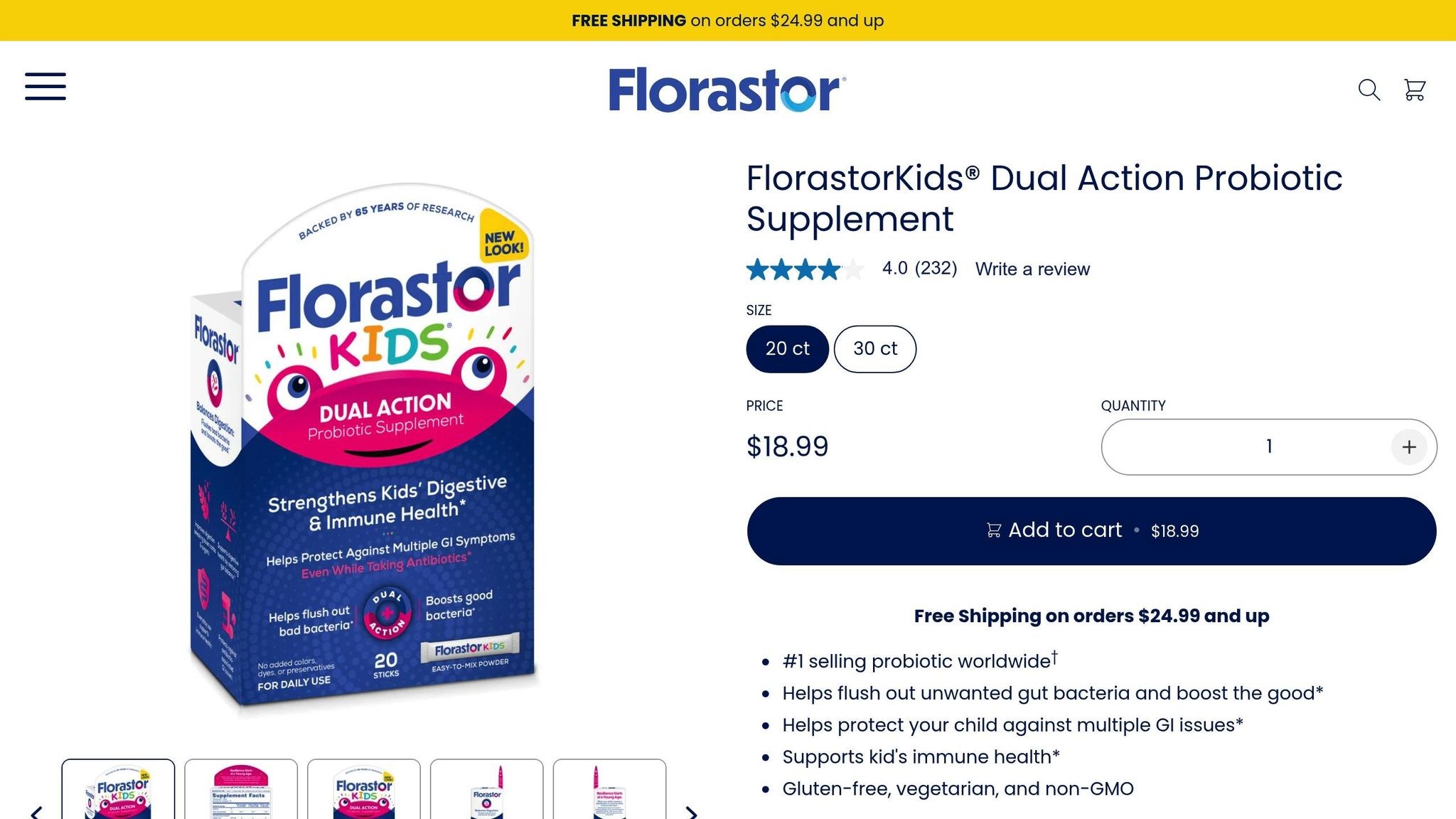
Florastor Kids Daily Probiotic is a well-known yeast-based supplement crafted to support children's digestive health.
Age Suitability
This supplement is made for children as young as 2 months old. It's often highlighted as an excellent choice for infants needing probiotic support.
CFU Content and Strains
Florastor Kids features the probiotic strain Saccharomyces boulardii CNCM I-745. Each sachet contains 250 mg of this strain. Backed by over 65 years of use and more than 1,000 scientific publications, this yeast strain is known for stimulating the body's production of IgA, a key antibody that helps protect against harmful bacteria. Notably, Florastor is the only probiotic on the market that uses Saccharomyces boulardii CNCM I-745.
Delivery Format
The supplement comes in convenient stick packets. The powder dissolves easily in food or drinks and has a tutti-frutti flavor that appeals to kids.
Allergen and Dietary Considerations
Florastor Kids is vegetarian, gluten-free, and free from titanium dioxide. While it does contain lactose, it’s generally suitable for children with lactose intolerance, as it promotes lactase production - the enzyme needed to break down lactose. The formulation avoids common allergens like peanuts, tree nuts, sesame, soy, meat, fish, shellfish, eggs, and gluten. However, it does include corn and milk-derived lactose. Parents of children genetically unable to produce lactase should be cautious.
With prices ranging from $18.99 to $28.99 depending on the retailer and an impressive Amazon rating of 4.7 out of 5 stars, Florastor Kids stands out as a trusted option for families looking to support their children’s digestive health.
3. Lovebug Toddler Probiotics
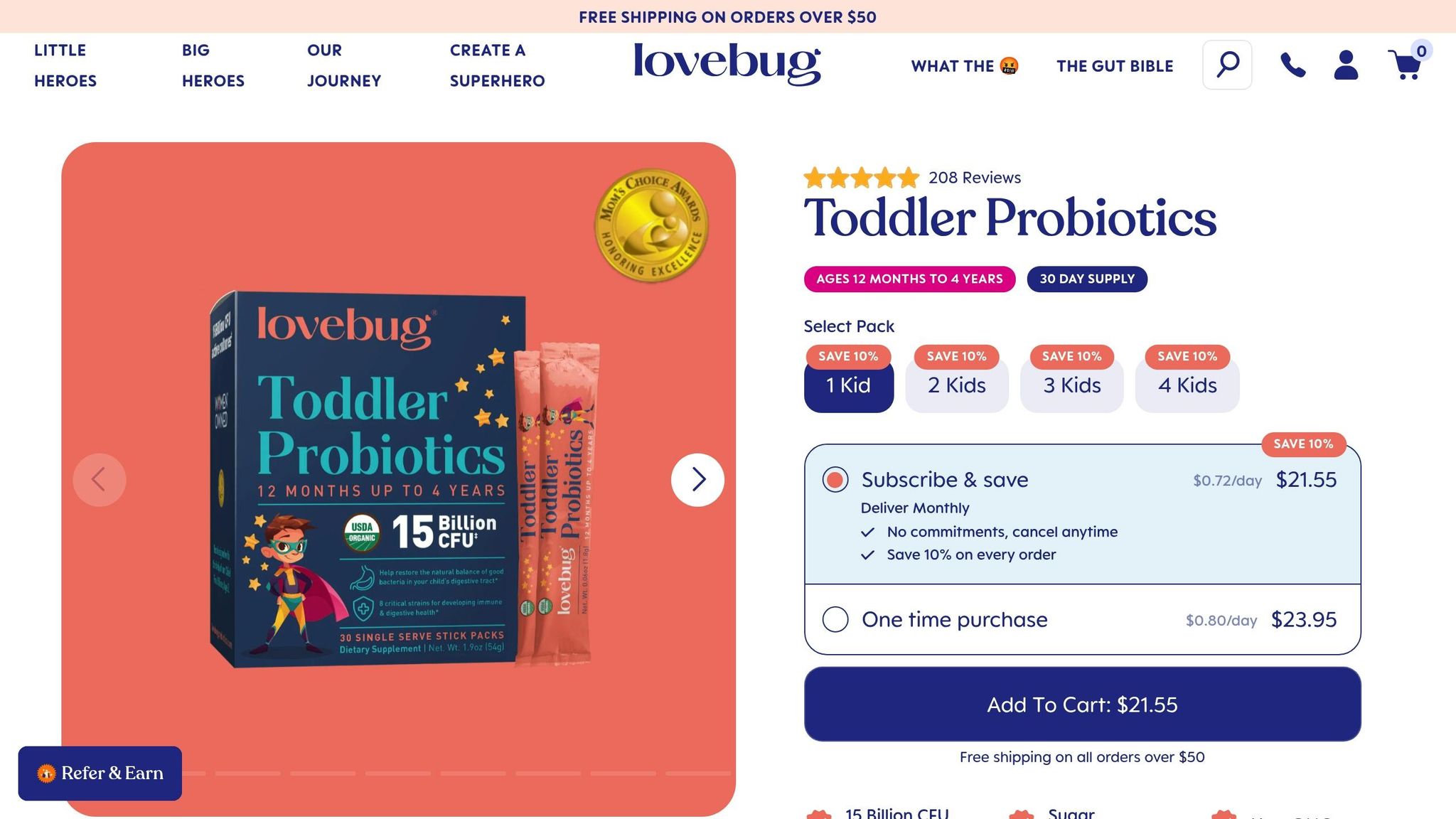
Lovebug Toddler Probiotics is specially crafted to support the developmental needs of young children during a crucial time for gut health.
Age Suitability
This probiotic is tailored for toddlers aged 12 months to 4 years. By the time kids turn three, their gut microbiome reaches a stable state. However, since children under two often receive more antibiotics than other age groups, probiotics can help replenish beneficial bacteria, promoting healthier digestion and stronger immune function.
CFU Content and Strains
Each serving of Lovebug Toddler Probiotics provides 15 billion colony-forming units (CFU) from a blend of eight targeted strains. These include:
- Bifidobacterium lactis
- Bifidobacterium infantis
- Lactobacillus casei
- Lactobacillus paracasei
- Lactobacillus rhamnosus GG
- Lactobacillus gasseri
- Lactobacillus reuteri
- Bifidobacterium longum
The standout strains include Lactobacillus rhamnosus GG, the most clinically studied probiotic strain, and Bifidobacterium infantis, often regarded as a powerhouse strain for babies.
"LoveBug Tiny Tummies Daily Probiotic 12 Months-4 Years prioritizes your baby's health with eight targeted strains, including the number-one, clinically studied strain, L. rhamnosus GG and the super strain for babies, B. infantis."
Delivery Format
Each stick pack contains a pre-measured, tasteless powder that dissolves quickly in cool foods or drinks. Its neutral flavor makes it easy to mix with toddler favorites like milk, coconut water, or yogurt. Avoiding warm liquids is essential to maintain the probiotics' live cultures.
Allergen and Dietary Considerations
This probiotic is thoughtfully designed to accommodate common dietary restrictions. It's non-GMO, free from allergens such as gluten, soy, and dairy, and is also vegan-friendly. Additionally, it’s made with organic ingredients and contains no artificial colors or flavors, making it a great choice for toddlers with dietary sensitivities.
Pricing and Customer Feedback
The price ranges between $19.16 and $25.00, and it holds an impressive average rating of 4.6 out of 5 stars on Amazon. Parents frequently praise its positive impact on their children's digestive health, noting improvements in issues like constipation and bloating.
sbb-itb-1bbfe7f
4. NOW BerryDophilus Kids Chewables
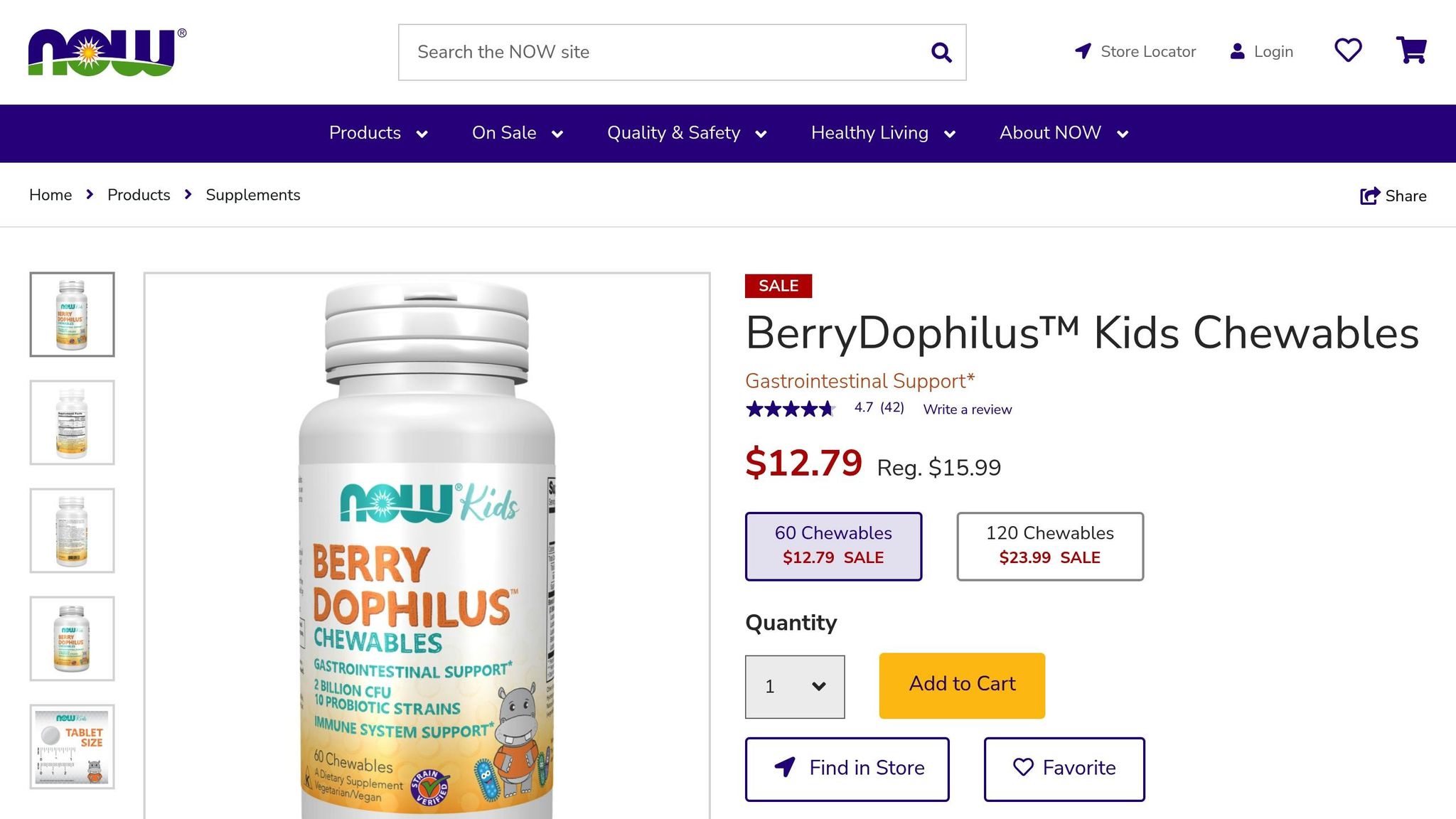
Keeping the focus on probiotics designed for children, NOW BerryDophilus Kids Chewables offers a flavorful and easy-to-use option for young ones.
Age Suitability
This probiotic is specifically designed for children aged 2 and older. For children under 2, it's recommended to consult a healthcare provider before use. The suggested dose is 1 chewable tablet, taken 1 to 3 times daily, either between meals or on an empty stomach.
CFU Content and Strains
Each chewable tablet contains 2 billion CFU from a blend of 10 verified probiotic strains. These strains are identity-verified through DNA fingerprinting to ensure quality and consistency. The probiotic strains included are:
- Lactobacillus acidophilus (La-14)
- Bifidobacterium lactis (Bl-04)
- Lactobacillus plantarum (Lp-115)
- Lactobacillus casei (Lc-11)
- Lactobacillus rhamnosus (Lr-32)
- Lactobacillus paracasei (Lpc-37)
- Bifidobacterium breve (Bb-18)
- Streptococcus thermophilus (St-21)
- Lactobacillus salivarius (Ls-33)
- Bifidobacterium longum (BI-05)
"Most probiotics for kids only include 1 or 2 strains of probiotics in them, and the counts are low. This product is much better, with 10 strains and 2 billion count of them. And they taste delicious too. Tart berry taste and non-chalky chewable." – Melanie M., Amazon Customer
Delivery Format
These probiotics come in a chewable tablet format, making them an excellent choice for children who are comfortable with solid foods. The tablets feature a tart berry flavor and are sweetened with xylitol, which is tooth-friendly. Their smooth, non-chalky texture makes them easy to chew and swallow, addressing a common issue with many chewable supplements.
Allergen and Dietary Considerations
NOW BerryDophilus Kids Chewables are designed to meet a wide range of dietary needs. They are vegetarian/vegan, kosher, halal, and gluten-free. Additionally, they are free from common allergens, including wheat, soy, milk, eggs, fish, shellfish, tree nuts, and sesame.
Parents frequently highlight the product's effectiveness and value, with many praising its berry flavor and xylitol sweetening as a major plus. This makes it a popular choice for families looking for a probiotic that kids will actually enjoy taking.
5. PDS-08 Pediatric Daily Synbiotic
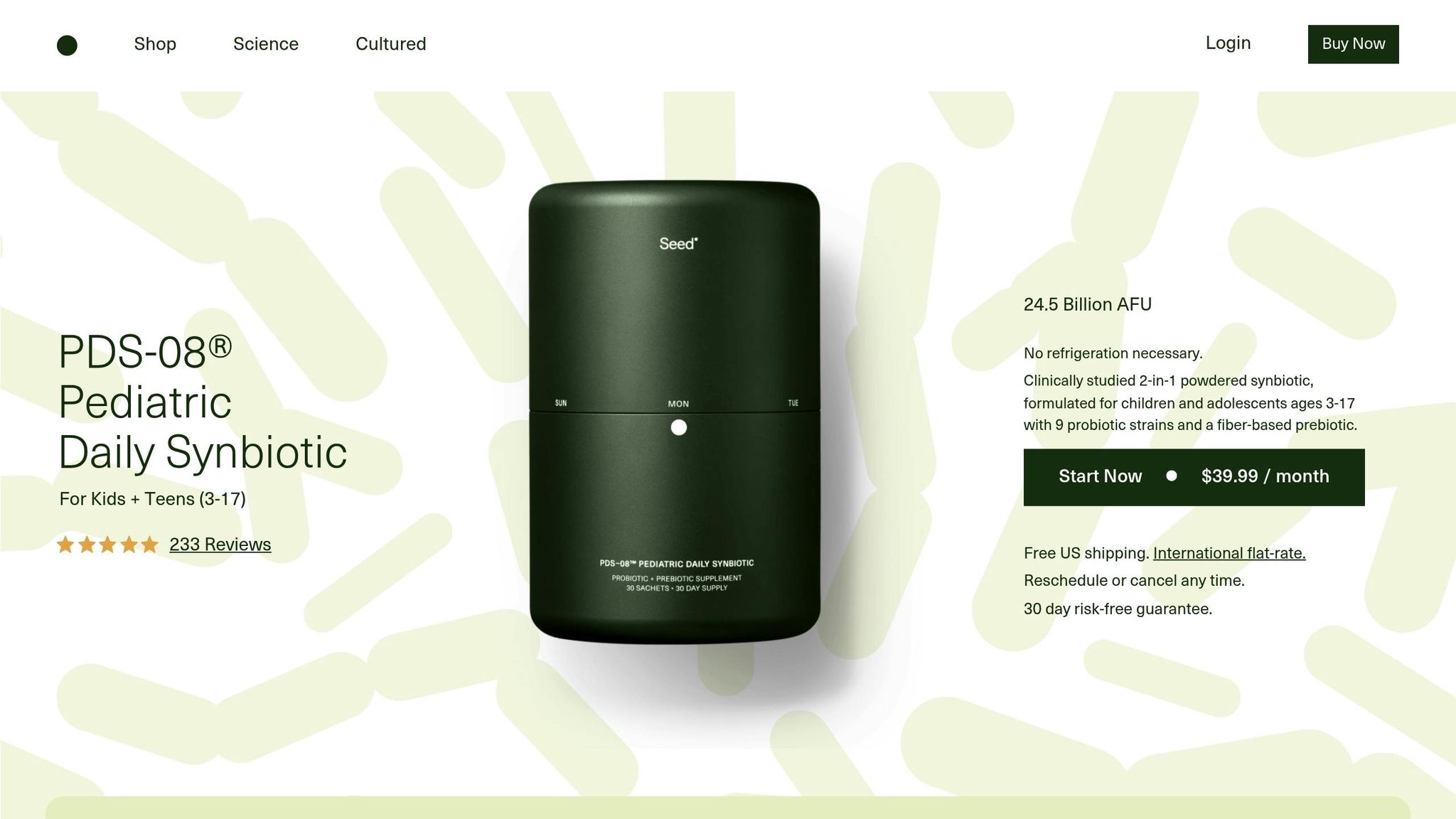
PDS-08 Pediatric Daily Synbiotic is designed specifically to support children's gut health by combining probiotics and prebiotics in a targeted formula.
Age Suitability
This synbiotic is tailored for children and teenagers aged 3 to 17, addressing their changing digestive, immune, and skin health needs.
CFU Content and Strains
Each serving of PDS-08 delivers an impressive 20 billion AFU (Active Fluorescent Units) from 9 carefully selected probiotic strains, grouped into three specialized blends:
- Gastrointestinal blend (17 billion AFU): Includes Lacticaseibacillus rhamnosus SD-GG-IT, Lactobacillus acidophilus SD-NCFM-US, Bifidobacterium lactis SD-Bi07-US, and Bifidobacterium breve SD-BR3-IT.
- Respiratory blend (2 billion AFU): Features Bifidobacterium breve SD-B632-IT and Ligilactobacillus salivarius SD-LS01-IT.
- Dermatological blend (1 billion AFU): Contains Bifidobacterium lactis SD-CECT8145-SP, Bifidobacterium longum SD-CECT7347-SP, and Lacticaseibacillus casei SD-CECT9104-SP.
In addition to probiotics, each serving provides 5 grams of prebiotic fiber. This helps fill a common nutritional gap, as 95% of children and adults in the U.S. fall short of the recommended daily fiber intake.
"PDS-08 Pediatric Daily Synbiotic is a clinically studied synbiotic formulated for ages 3-17 with 9 probiotic strains and a fiber-based prebiotic." - Seed Health
Delivery Format
PDS-08 comes in convenient, flavorless powder sachets. The powder can be mixed into room-temperature or cold foods, making it easy to incorporate into meals. Plus, the BacTrac™ container helps parents keep track of daily usage.
Allergen and Dietary Considerations
This synbiotic is vegan, vegetarian-friendly, and free from 14 major allergens, including dairy, gluten, soy, corn, and nuts. It meets EFSA standards and doesn’t require refrigeration, making it a practical choice for both home and travel.
PDS-08 is priced at $39.99 per month, with subscription discounts available. It has earned a 4.5-star rating on Amazon.
Product Comparison Table
Choosing the right biotic supplement for your child can feel overwhelming, but a side-by-side comparison of key features makes it easier to decide. Below, you'll find a breakdown of essential details for each product to help you match the supplement to your child's specific needs.
| Product | Age Range | CFU/AFU Content | Key Strains | Delivery Format | Dietary Considerations | Storage Requirements |
|---|---|---|---|---|---|---|
| Begin Rebirth RE-1™ | 12 months and up | 500 billion CFU | Human Origin Strains (HOSt™) | Powder sachets | Vegan, gluten-free, dairy-free, soy-free, nut-free, non-GMO | No refrigeration required |
| Florastor Kids Daily Probiotic Supplement | 2 months and up | 5 billion CFU | Saccharomyces boulardii | Powder sachets | Gluten-free, vegetarian | Room temperature storage |
| Lovebug Toddler Probiotics | 12 months to 4 years | 10 billion CFU | 6 species of Bifidobacterium and Lactobacillus | Chewable tablets (berry flavor) | Allergen-friendly | Shelf-stable |
| NOW BerryDophilus Kids Chewables | 2 years and up | 2 billion CFU | 10 strains including Lactobacillus acidophilus, Bifidobacterium lactis, Lactobacillus plantarum, Lactobacillus casei, Lactobacillus rhamnosus, Lactobacillus paracasei, Bifidobacterium breve, Streptococcus thermophilus, Lactobacillus salivarius, and Bifidobacterium longum | Chewable tablets (berry flavor) | Vegetarian, no artificial colors | Room temperature storage |
| PDS-08 Pediatric Daily Synbiotic | 3–17 years | 20 billion AFU | 9 targeted probiotic strains (grouped in gastrointestinal, respiratory, and dermatological blends) | Flavorless powder sachets | Vegan | No refrigeration required |
Each supplement has its own strengths. Begin Rebirth RE-1™ stands out with its impressive 500 billion CFU count, while NOW BerryDophilus has the lowest at 2 billion CFU. The age range also varies, ensuring options for infants, toddlers, and older children.
When it comes to delivery formats, it’s all about preferences. Powder sachets, like those from Begin Rebirth RE-1™ and PDS-08, are easy to mix into food or drinks, while chewable tablets, such as Lovebug Toddler Probiotics and NOW BerryDophilus, offer a kid-friendly berry flavor. Both Begin Rebirth RE-1™ and PDS-08 are also convenient for travel, thanks to their non-refrigerated storage.
"Probiotics are generally considered safe for healthy children, but caution is advised for some populations such as premature infants, immunocompromised children, or those who are critically ill".
Strain diversity is another key factor. Florastor Kids relies on a single yeast strain, Saccharomyces boulardii, while NOW BerryDophilus provides a mix of 10 strains for broader support. Meanwhile, Begin Rebirth RE-1™ features its proprietary Human Origin Strains (HOSt™) technology, tailored to align with the human microbiome.
Ultimately, selecting the right supplement depends on aligning the product with your child’s age, health needs, and lifestyle.
Conclusion
As we've explored, a child's gut microbiome develops rapidly, making targeted, age-specific support crucial. Selecting the right biotic supplements can play a key role in nurturing your child's growing gut and strengthening their immune system.
Options range from advanced 3-in-1 formulations like Begin Rebirth RE-1™ - which delivers an impressive 500 billion CFU - to simpler, single-strain products designed for infants, such as Florastor Kids Daily Probiotic Supplement, safe for babies as young as 2 months. These tailored formulations are designed to address specific needs, from improving digestion to enhancing immunity.
Research backs the effectiveness of specific probiotic strains. For instance, Lactobacillus rhamnosus GG has been shown to shorten the duration of upper respiratory infections in children, while clinical studies highlight reduced respiratory infection rates in toddlers thanks to certain strains.
When choosing a supplement, consider your child's age, health profile, and developmental stage. Consulting a pediatrician is essential - they can evaluate your child's unique health needs, check for any contraindications, and recommend the right product and dosage based on their medical history and current condition.
Ultimately, biotic supplements should be tailored to meet individual needs. With guidance from a healthcare professional, you can craft a plan that genuinely supports your child's growth and overall well-being.
FAQs
What should I consider when selecting a biotic supplement for my child's age group?
When choosing a biotic supplement for your child, you’ll want to take their age into account since many supplements are designed to address specific stages of growth. It’s equally important to confirm the product is safe for kids, especially if your child has a weakened immune system.
Opt for supplements that offer age-appropriate dosages, a variety of strains, and a sufficient CFU (colony-forming unit) count to promote healthy digestion and gut balance. Prioritize products that are high-quality and backed by research, ensuring they’re specifically formulated to support children’s unique health needs.
What are probiotics, prebiotics, and postbiotics, and how do they work together to support kids' gut health?
Probiotics are live microorganisms that support a healthy gut by maintaining a balanced microbiome. Prebiotics, on the other hand, are non-digestible fibers that serve as nourishment for these beneficial bacteria, helping them thrive. Then there are postbiotics - these are the useful byproducts created when probiotics digest prebiotics. These compounds can play a role in boosting immune health and reducing inflammation.
When combined, probiotics, prebiotics, and postbiotics work together to create a powerful team. This trio helps restore balance in the gut, enhances the immune system, and improves nutrient absorption - all of which are crucial for a child’s overall health and development.
What should I know about potential side effects or precautions when giving biotic supplements to infants and young children?
While supplements aimed at gut health can be beneficial, infants and young children might occasionally experience mild side effects like gas, bloating, constipation, diarrhea, or stomach discomfort. These reactions are more common in kids with sensitive digestive systems. In rare instances, allergic reactions could happen, so it’s essential to keep an eye on your child after starting any new supplement.
For infants, particularly those born prematurely or with existing health concerns, it’s crucial to consult a pediatrician before introducing supplements. The FDA has advised against giving probiotics to very young babies without medical supervision due to potential risks. Always put safety first and rely on professional advice to ensure the supplement suits your child’s health and developmental stage.

